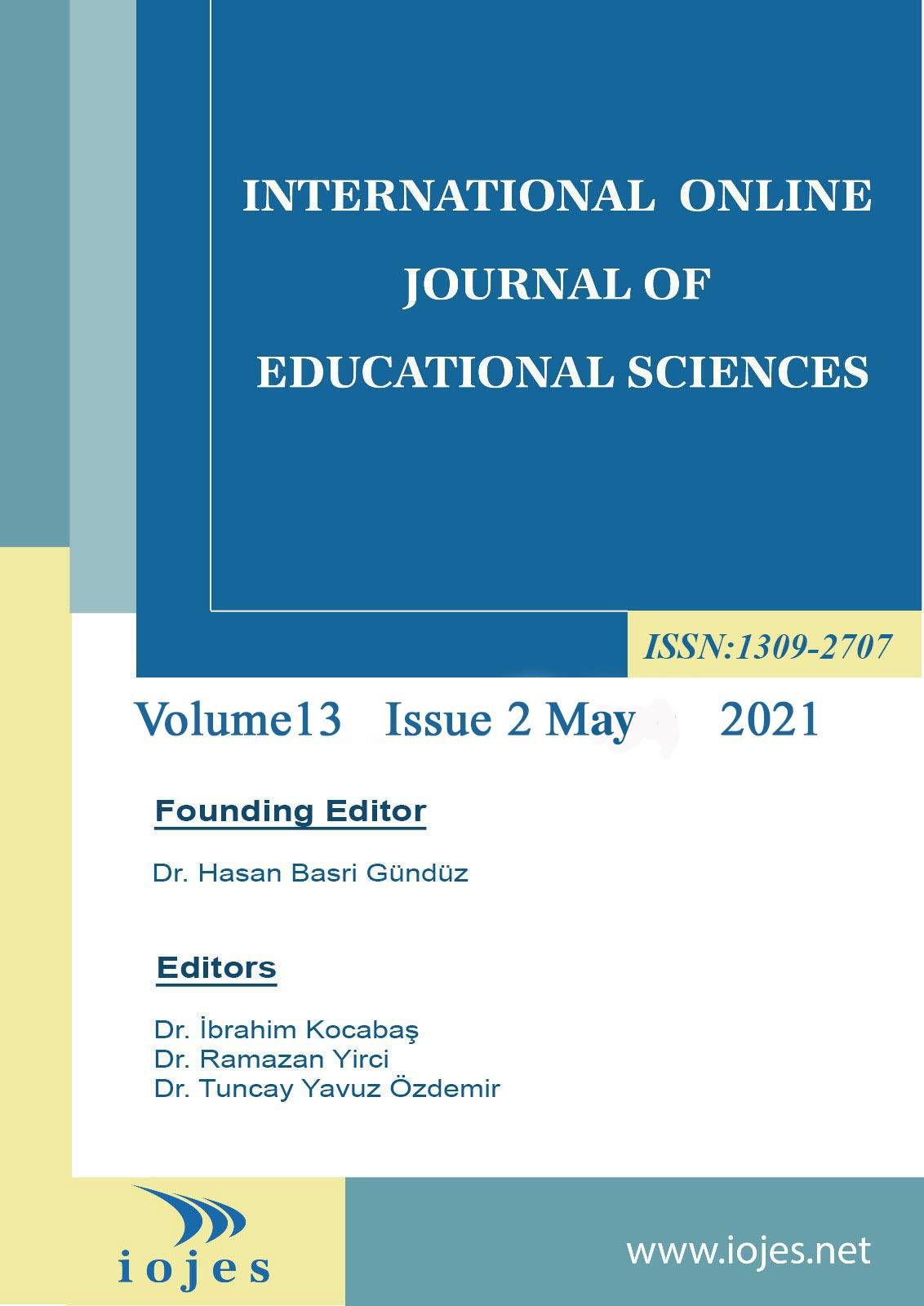Author :
Abstract
Keywords
Abstract
The purpose of this study is to examine the scientific articles about digital citizenship in terms of bibliometric indicators. Case study method, one of the qualitative research methods, was applied in this present study. The scanning range of bibliometric data in the WoS database generated by Clarivate Analytics covers the period between 1975 and December, 2019. The bibliometric analysis technique was conducted in the study. The studies were searched by writing “digital citizenship” in the search engine of the WoS database. The analysis revealed that there were 144 studies related to the digital citizenship registered in the WoS database between 1975 and 2019. It is concluded in these records that education / training research is at the forefront. In the analysis, it was observed that the most common type of publication related to digital citizenship was the articles with the total number of 85 studies. Besides, it was determined that approximately 97% of the published articles were published in the last ten years. This rate indicates that the educational researches related to digital citizenship have increased in recent years.
Keywords
- Aşkar, P. & Akkoyunlu, B., (2007). Okullarda bilişim teknolojileri ve öğretmen yetiştirme politikaları: türkiye deneyimine tarihsel bir bakış, Uluslararası Öğretmen Yetiştirme Politikaları ve Sorunları Sempozyumu, Mayıs, Bakü (2007), Bildiriler Kitabı.
- Aygun, M., & Ilhan, G. O. (2020). Analysis of in-Service and Pre-Service Social Studies Teachers' Digital Citizenship, International Online Journal of Educational Sciences, 12(4), 123-146.
- Chao, C. C., Yang, J. M., & Jen, W. Y. (2007). Determining technology trends and forecasts of RFID by a historical review and bibliometric analysis from 1991 to 2005. Technovation, 27(5), 268-279.
- Choi, M. (2016). A concept analysis of digital citizenship for democratic citizenship education in the ınternet age. Theory and Research in Social Education, 44(4), 565-607.
- Conley, K. (2010). We’re Not in Kansas Anymore. Learning & Leading with Technology, March/April 2010, 5. Correlation to CyberSmart! Workshop (2007). Online Professional Development to ISTE National Educational Technology Standards for Students: The Next Generation.
- Çakmak, Z.&Aslan, S. (2018). Sosyal bilgiler öğretmen adaylarının dijital vatandaşlık davranışlarının bazı değişkenler açısından incelenmesi. Adıyaman Üniversitesi Eğitim Bilimleri Dergisi, 8(1), 72-99.
- Çarıkçı, O. (2010). Türkiye'de E-devlet Uygulamaları Üzerine Bir Araştırma. Süleyman Demirel Üniversitesi Sosyal Bilimler Enstitüsü Dergisi, 2(12), 95-122.
- Çubukcu, Ş. & Bayzan, Ş. (2013). Türkiye’de Dijital Vatandaşlık Algısı ve Bu Algıyı İnternetin Bilinçli, Güvenli ve Etkin Kullanımı ile Artırma Yöntemleri. Middle Eastern & African Journal of Educational Research, 5(3),25-31.
- Dere, İ. & Yavuzay, M. (2019). Sosyal Bilgiler Öğretmen Adaylarının Dijital Vatandaşlık Göstergelerinin İncelenmesi. Manas Sosyal Araştırmalar Dergisi, 8(3), 2400-2414.
- Diodato V. (1994). Dictionary of Bibliometric. Haworth Press: Binghamton, NY.
- Eid, M. & Ward, S. (2009). Ethics, New Media and Social Networks. Global Media Journal, 2(1), 1-4.
- Güzeller, O.S. & Çeliker, N. (2017). Geçmişten Günümüze Gastronomi Bilimi: Bibliyometrik Bir Analiz, Journal of Tourism and Gastronomy Studies, 5(2), 88-102.
- Görmez, E. (2017). İlkokul Sosyal Bilgiler Programının Dijital Vatandaşlık ve Alt Boyutları Açısından Yeterliliği. The Journal of Academic Social Science Studies, 60(3), 1-15.
- Karaduman, H. & Öztürk, C. (2014). Sosyal Bilgiler Dersinde Dijital Vatandaşlığa Dayalı Etkinliklerin Öğrencilerin Dijital Vatandaşlık Tutumlarına Etkisi ve Dijital Vatandaşlık Anlayışlarına Yansımaları. Journal of Social Studies Education Research, 5(1), 38-78.
- Karaduman, H., Çengelci Köse, T. & Eryılmaz, Ö. (2017). Sosyal Bilgiler Öğretmen Adaylarına Göre Sosyal Medyada Değerler. Turkish Online Journal of Qualitative Inquiry, 8(2), 250-271.
- Karagöz, B. & Şeref, I. (2019). Yunus Emre ile İlgili Araştırmaların Bibliyometrik Analizi. Akdeniz Eğitim Araştırmaları Dergisi, 13(27), 123-141.
- Karaman, M. K., Ekici, M. & Karabulut, B. (2009). Dijital Vatandaşlık, I. Uluslararası Avrupa Birliği, Demokrasi, Vatandaşlık ve Vatandaşlık Eğitimi Sempozyumu, Uşak.
- Kocadağ, T. (2012). Determining the Digital Citizenship Levels of Prospective Teachers. [Unpublished master’s thesis]. Karadeniz Teknik University. Thesis Number:321888 https://tez.yok.gov.tr/.
- Mossberger, K., Tolbert, C., & S. McNeal, R. (2007). Digital Citizenship: The Internet, Society, and Participation. London, England: The MIT Press.
- Özoğul, P. (2006). Problems that computer teachers meet ın theır professıonal lıves: a case ın eskısehir. [Unpublished master’s thesis]. Institute of Educational Science, Anadolu University. Thesis Number:257117 https://tez.yok.gov.tr/.
- Polat, A.Z., Saraçoğlu, A. & Duman, H. (2019). Harita Dergisi’nin Bibliyometrik Analizi, Harita Dergisi, 16(1), 46-56.
- Ribble, M. (2004). Digital Citizenship: Addressing Appropriate Technology Behavior. Learning and Leading with Technology, 32(1), 6-11.
- Ribble, M. & Bailey, G. (2007). Digital Citizenship İn Schools. Washington, DC: International Society for Technology in Education.
- Ribble, M. (2011). Digital Citizenship in Schools. International Society for Technology in Education: Washington.
- Sönmez, Ö. F. & Kocadağ Ünver, T. (2020). Dijital Vatandaşlık ve Sosyal Bilgiler Eğitimi. R. Turan ve H. Akdağ. (Ed.), 1. Baskı içinde, Sosyal Bilgiler Öğretiminde Yeni Yaklaşımlar IV (139-152). Ankara: Pegem Akademi.
- Ünal Dilşat, P. (2017). Bir Öğretim Programındaki Dijital Vatandaşlık Öğeleri ve Ortaöğretim Öğrencilerinin Dijital Vatandaşlık Ögelerine Sahip Olma Durumları, Karaelmas Journal of Educational Sciences, 5(2), 180-195.
- Prensky, M. (2001). Digital Natives, Digital Immigrants Part 1. On the Horizon, 9(5), 1-6.
- İşman, A. & Güngören, Ö. C. (2014). Digital Citizenship. TOJET: The Turkish Online Journal of Educational Technology, 13(1), 73-77.
- Trapero F.G.A., Parra J.C.V. & Martínez M.J.G. (2020). Digital citizenship approach and teacher profile. Education in the Knowledge Society, 21(6), 1-11.
- Tsay, M. Y.,&Yang, Y. H. (2005). Bibliometric analysis of the literature of randomized controlled trials. Journal of the Medical Library Association, 93(4), 450-458.
- Yalçınkaya, B. & Cibaroğlu, M. O. (2019), Dijital Vatandaşlık Algısının İncelenmesi: Ampirik Bir Değerlendirme, BMIJ, 7(4), 1188-1208
- Yıldırım, A. & Şimşek, H. (2011). Sosyal bilimlerde nitel araştırma yöntemleri. Ankara: Seçkin Yayıncılık.





